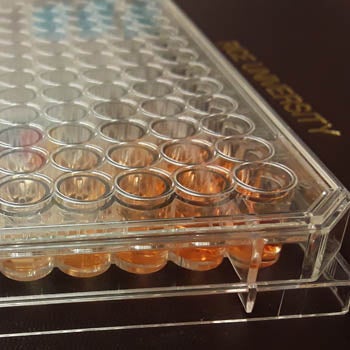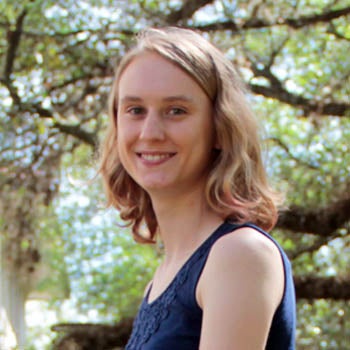Major: Chemistry
Minor: Statistics
Research Advisor: Zach Ball
For sophomore Hallie Trial, the opportunities to work on challenging research problems and the supportive community she found in the chemistry department convinced her to pursue a chemistry major.
Hallie came to Rice wanting to do impactful research in science, but she was unsure what discipline she liked best. “I knew that I was interested in chemistry, so I decided to take Organic Chemistry I and Freshman Chemistry Seminar during my first semester to see how I liked it,” she said.
Chemistry’s connections to other areas of scientific inquiry convinced her this was the right path. Her organic chemistry professor, Jim Tour, included “special topics” at the end of lectures, often talking about modern and historical chemistry research, while Freshman Chemistry Seminar introduced her to the types of projects that Rice students work on in their labs.
“This combination demonstrated to me the power of chemistry research to change the world for the better,” Hallie said. “No matter what matters most to you — the environment, human health, technology or anything else—there’s a way to use chemistry to make a meaningful impact.”

Her chemistry coursework — ranging from quantum mechanics in physical chemistry to cellular respiration in biochemistry — gives her a broad framework for understanding the world around her and provides a community of students who share the same struggles and interests. “I find the chemistry community here at Rice extremely tight-knit and supportive,” said Hallie. “It’s a small enough group that most chemistry majors in the same year seem to know each other. Together, we solve problem sets, talk about our research, discuss our classes and laugh at our professors’ idiosyncrasies.”
Hallie also enjoys being a part of a close-knit community working on difficult chemistry problems as a member of Zach Ball’s research group. “We take our science seriously, but not ourselves. We joke around a lot, and the time we spend together is always fun,” she said.
As a member of the Ball group, Hallie focuses on addressing the question: How do we develop reactions to site-selectively modify proteins and peptides when there are often (usually) many copies of the same amino acid in any polypeptide? “Traditional organic chemistry approaches work at the functional group level, but we have to come up with new reaction frameworks because there are many of the same functional group in each polypeptide,” she said.
Specifically, Hallie is working on using a method previously developed in the Ball group to install a photocage onto a peptide.
“A photocage is a group that you can attach to a molecule, usually some kind of biomolecule,” Hallie explained. “When you shine light of the appropriate wavelength onto the biomolecule, the photocage falls off.” Researchers can disrupt the structure and function of a biomolecule by attaching a photocage, and then, when they make the photocage fall off, restore the functionality of the biomolecule—essentially using light to turn the biomolecule on.
Most photocages need UV light to trigger their release, but UV light damages cells, making it less suitable for biological or medical applications than visible or infrared light. Hallie has designed, synthesized and tested a 2-photon photocage that is released by IR light.
“A 2-photon-sensitive photocage can absorb two photons at the same time with half the energy it would usually take to trigger photocleavage, which enables it to cleave at longer wavelengths. The 2-photon-sensitivity effectively shifted our cleavage wavelength into the near IR range. IR light can also penetrate tissue, which is another reason why this system is better for biological systems,” Hallie said.
Outside of her science courses, one of Hallie’s favorite things about Rice is the residential college system. “I’m an introvert,” she said. “My residential college presented me with a smaller and more manageable social unit to incorporate myself into. Some of my closest friends are the people I met at my residential college during my first few weeks at Rice.”
Hallie’s extracurricular activities also bring together these two themes: connecting with people and sharing a love of science. As a member of the outreach group Fun With Chemistry, she brings exciting chemistry demos to Houston-area K-12 schools. And as a science writing intern for the School of Natural Sciences, Hallie connects with Rice researchers in all of the natural sciences disciplines. “I have the opportunity to learn about a diverse array of science outside my immediate field, and I love it,” she said.
After graduation, Hallie plans to pursue a Ph.D. in chemistry with the hopes of becoming a professor and researcher. Until then, she will continue building the scientific knowledge and developing the communication and teaching skills needed for the job—all while having fun with others who share her interests.

